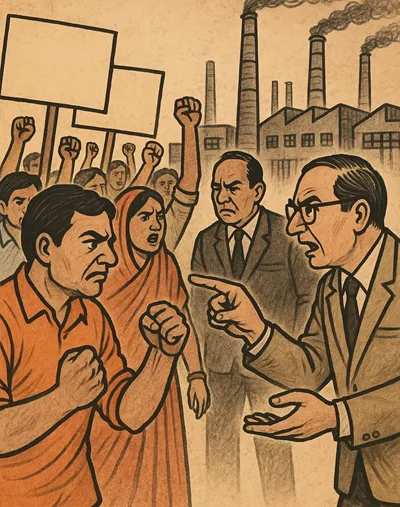
The Industrial Disputes Act, 2020, talks about the rights and duties of workers and employers in offices, factories, and other workplaces. It helps manage job-related disputes, union matters, and rules for hiring or firing workers.
What does this law do?
-
- Solves Disputes Easily
-
If workers and employers have any disagreements (about salary, work conditions, etc.), the law provides a process to resolve them through negotiation, with help from the government if needed.
-
- Clear Rules for Strikes
-
Workers must give 14 days’ notice before going on strike. No strikes are allowed during active talks with the government or courts.
-
- Recognizes Trade Unions
-
If more than half the workers are part of one union, it will be accepted as the main one to talk to the employer.
-
- Rules for Laying Off Workers
-
If a company has 300 or more workers, it must take government permission before firing workers or shutting down.
-
- Fixed-Term Jobs
-
Companies can hire people for short contracts (like 1 year), but these workers must get the same pay and benefits as regular staff.
-
- Support for Laid-Off Workers
-
Employers must put money into a Re-Skilling Fund to help retrain workers who lose their jobs.
-
- Solves Employee Complaints
-
Every workplace with 20+ workers must form a team to handle complaints from workers quickly and fairly.
What old laws were replaced?
This code combines and simplifies 3 old labour laws:
- Industrial Disputes Act, 1947
- Trade Unions Act, 1926
- Industrial Employment (Standing Orders) Act, 1946
Industrial Relations Code, 2020 – FAQs
-
1. What is this Code about?
-
It sets rules for how employers and workers should deal with job-related disputes, strikes, trade unions, and hiring/firing.
-
2. Does it apply to private companies or only government jobs?
-
It applies to both private and government sector workplaces, especially with 50 or more workers.
-
3. Can workers still form unions?
-
Yes, workers can still form trade unions and negotiate with employers.
-
4. What is a “recognised trade union”?
-
If more than 50% of workers in a company are in one union, that union becomes the main one to talk to the employer.
-
5. Can a company stop a worker from joining a union?
-
No. It is illegal to stop or punish a worker for joining a union.
-
6. When can workers go on strike legally?
-
Only after giving 14 days' notice and not during any ongoing negotiation or court process.
-
7. Can a company fire workers without notice?
-
Not if the company has 300 or more workers. They need government permission to fire or lay off workers.
-
8. What is a fixed-term worker?
-
Someone hired for a set time (e.g., 6 months or 1 year). They now get the same benefits and pay as permanent employees.
-
9. Is there any help for workers who lose their job?
-
Yes. The law creates a Re-Skilling Fund to train laid-off workers for new jobs.
-
10. Can workers complain about unfair treatment?
-
Yes. Workplaces with 20+ workers must set up a team to listen to and resolve complaints.
-
11. What happens during a labour dispute?
-
The dispute is first tried to be settled by discussion, then with help from labour officers, and finally in a labour court if needed.
-
12. Is a strike allowed in all types of jobs?
-
Strikes are allowed but with proper notice. In some essential services, strikes can be banned temporarily.
-
13. Can my boss change working hours or rules suddenly?
-
No. In large companies, any rule change needs to be communicated to workers and approved as per Standing Orders.
-
14. Who will help workers if the company violates rules?
-
Labour Commissioners or Industrial Tribunals can help settle such disputes legally.
-
15. Are small businesses covered?
-
Some rules apply only if the business has a certain number of workers (e.g., 50 or 300). Smaller firms may not need to follow all provisions.
-
16. What is a standing order?
-
It's a document that lists rules for conduct, leave, discipline, etc., that companies must follow.
-
17. Can a company close down suddenly?
-
No. A company with 300+ workers needs government approval before shutting down.
-
18. Is the notice period the same for all workers?
-
The law gives minimum standards, but the company policy or contract can define longer notice periods.
-
19. Can the government stop a strike?
-
Yes, during ongoing negotiations, national emergencies, or essential public services, the government can delay or stop a strike.
-
20. Is this Code already in effect?
-
The Code has been passed but may be implemented by the government gradually, along with rules from each state.
Add new comment